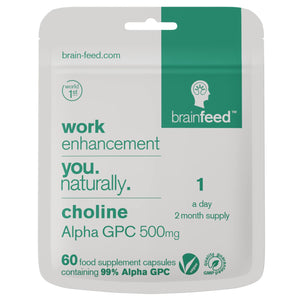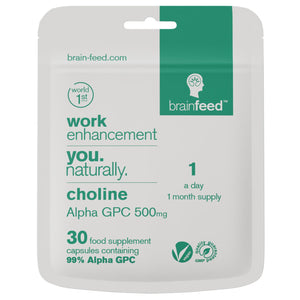Best foods before an exam for improved memory and focus
filter
Exams are a chance to demonstrate your hard work, and what you eat can significantly impact your performance. A well-balanced diet is essential for optimal focus, memory, and energy during this time. Prioritising nutritious foods can help you enhance your overall cognitive function. As you prepare for your exams, consider the foods that fuel your brain, support your sleep and exercise regime, and manage learning effectively. With the right nutrition strategy in place, you’ll be better equipped to excel and reach your academic goals. Here's 5 evidence-based strategies to adapt for excellent results.
What is the best food to eat before an exam?
Your brain uses a nutrient called choline to make its learning and memory brain chemical called acetylcholine. A study of over 300 students found that those with higher choline intake scored higher grades[1 Trusted Source 2016 - FASEB Journal Human study Plasma 1-carbon metabolites and academic achievement in 15-yr-old adolescents ] . Even among adults, those who had higher choline intake performed better at verbal and visual memory tests[2 Trusted Source 2011 - The American Journal of Clinical Nutrition Human study The relation of dietary choline to cognitive performance and white-matter hyperintensity in the Framingham Offspring Cohort ] .
Choline can be found in protein-rich foods that help you focus like beef, eggs, salmon, and soy. It is also available as a safe and effective supplement, Alpha GPC, which is 41% choline. It works quickly, increasing acetylcholine levels 1-3 hours after intake[3 Trusted Source 2023 - Examine 3rd-party source Alpha GPC ] . This can help you learn faster and retain information better. Animal studies where Alpha GPC was provided after enduring 7 days of stress, helped reduce stress-induced memory loss[4 Trusted Source 2022 - Brain Research Animal study The effect of choline alphoscerate on non spatial memory and neuronal differentiation in a rat model of dual stress ] . It also protected new brain cells and promoted their growth[4 Trusted Source 2022 - Brain Research Animal study The effect of choline alphoscerate on non spatial memory and neuronal differentiation in a rat model of dual stress ] . It is wise to keep a steady supply of acetylcholine through food and/or a 500mg Alpha GPC capsule containing 99% Alpha GPC, to ensure your brain retains the material well.
What foods help you focus better?
Breakfast is indeed the most important meal of the day when it comes to exams - 77% of students who ate breakfast regularly had excellent grades[5 Trusted Source 2020 - Journal of Family Medicine and Primary Care Human study Relationship between nutritional habits and school performance among primary school students in Asser Region ] . Hunger resulting from skipping breakfast reduces concentration and motivation to study, leading to reduced learning in class[6 Trusted Source 2021 - Frontiers in Psychology Human study Breakfast Consumption and Academic Achievement Among Chinese Adolescents: A Moderated Mediation Model ] . Adults who ate breakfast 15-45 minutes before a test, recalled the information better than those who skipped breakfast[7 Trusted Source 2016 - Advances in Nutrition Systematic and meta-analysis The Effects of Breakfast and Breakfast Composition on Cognition in Adults ] . Make time for breakfast on exam day to perform your best. Build a winning brain breakfast by including carbohydrates that will release energy slowly throughout the day. Include the best food before an exam in the recipe such as wholegrain cereals, fruits, vegetables and eggs. These have been shown to help you perform better at memory and attention tests[8 Trusted Source 2016 - Advances in Nutrition Systematic and meta-analysis The Effects of Breakfast and Breakfast Composition on Cognition in Children and Adolescents: A Systematic Review ] .
Your overall exams diet quality can also make a difference in your academic performance. Those with a high intake of fruits and vegetables were 41% times less likely to fail their exams[9 Trusted Source 2008 - The Journal of School Health Human study Diet Quality and Academic Performance* ] . Plant nutrients protect brain cells against damage, promoting optimal function. For example, a plant nutrient called anthocyanin (found in blueberries) increases blood flow to the brain and helps improve attention and memory[10 Trusted Source 2020 - Molecules Systematic and meta-analysis Anthocyanins: A Comprehensive Review of Their Chemical Properties and Health Effects on Cardiovascular and Neurodegenerative Diseases ] .
What is the easiest way to get good grades? Stock up on water
Staying hydrated can help you focus better so you can study well. Dehydrated school students were educated about increasing water consumption, upon which their hydration levels increased by almost 50%. These students saw a 50% increase in attention test scores[11 Trusted Source 2021 - The Egyptian Journal of Community Medicine Human study Effect of Hydration Status of School Children on Cognitive Performance and Impact of Health Education on Their Drinking Behavior ] . When you are dehydrated, your body treats it as a stress situation (exams are stressful enough), increasing your stress hormone cortisol[12 Trusted Source 2014 - British Journal of Nutrition 3rd-party source Effects of hydration status on cognitive performance and mood ] . High cortisol levels decrease your processing speed and impact memory[12 Trusted Source 2014 - British Journal of Nutrition 3rd-party source Effects of hydration status on cognitive performance and mood ] . In another study, participants drank either nothing, 120ml or 330ml water before an attention test. Those who drank 330ml performed the best[13 Trusted Source 2001 - Appetite 3rd-party resource A drink of water can improve or impair mental performance depending on small differences in thirst ] . Water is needed for the transport of important nutrients and brain chemicals production which collectively impact brain performance. Better academic performance is another incentive to switch from sugary drinks to water. A review of 5 studies found that those with a high intake of sugary drinks reported poor academic performance. Those who rarely drank sugary drinks scored 7% higher in Maths and 5% higher in English compared to those who drank them often[14 Trusted Source 2022 - Nutrients Human study The Association between Sugar-Sweetened Beverages and High-Energy Diets and Academic Performance in Junior School Students ] . Who knew that good ol’ water can actually help you get better grades?
How to perform well on exams? Sleep is your best friend
You can improve 25% of your academic performance by fixing your sleep patterns[15 Trusted Source 2019 - NPJ Science of Learning Human study Sleep quality, duration, and consistency are associated with better academic performance in college students ] . You can get better grades by getting a good night’s sleep instead of spending sleepless nights cramming exam materials. So, how to do well in exam? The golden formula is consistently getting 7-8 hours. University students getting 7 hours of sleep regularly scored better than those who slept fewer hours[15 Trusted Source 2019 - NPJ Science of Learning Human study Sleep quality, duration, and consistency are associated with better academic performance in college students ] . When you spend hours learning study material, your brain takes these chunks of information and “codes” them to store them for longer. This coding takes place during sleep and allows you to remember information for longer[16 Trusted Source 2013 - Physiological Reviews Research evaluation About Sleep's Role in Memory ] .
How can I improve my focus and concentration? Sweat it out
Another way you can help your brain code all the information you learn is by exercise. A large base of evidence highlights the benefits of exercise in improving recall across all ages. Exercise increases blood flow to the brain and makes brain chemicals that make stronger connections and better networks in the brain[17 Trusted Source 2021 - Journal of Clinical Medicine Research evaluation Acute and Chronic Exercise Effects on Human Memory: What We Know and Where to Go from Here ] . How can I focus better with exercise? A review of 13 studies reported that even a short 10-minute workout, followed by a 5-minute cool down/recovery period before settling in to learn information can improve memory[18 Trusted Source 2020 - Translational Sports Medicine Systematic and meta-analysis Effects of a single exercise workout on memory and learning functions in young adults—A systematic review ] . The boosting effects last for 30-120 minutes. If you are looking to enhance long-term memory, 20-40 minutes of exercise has shown benefits[17 Trusted Source 2021 - Journal of Clinical Medicine Research evaluation Acute and Chronic Exercise Effects on Human Memory: What We Know and Where to Go from Here ] .
How to improve concentration and focus while studying
John Dunlosky, Professor of Psychology, reviewed over 200 studies comprising 169,179 participants and established that the most effective study techniques are Distributed Practice and Practice Testing[19 Trusted Source 2013 - Psychological Science in the Public Interest Systematic and meta-analysis Improving Students’ Learning With Effective Learning Techniques: Promising Directions From Cognitive and Educational Psychology ] . What’s the secret to being successful and how to get good grades? Distributed Practice is setting a practice schedule that is spread over time instead of learning chunks of material last minute. Practice Testing is self-testing using mock tests.
Jim Kwik, elite brain coach who helps world leaders, billionaires and celebrities learn and recall information quickly and for long provides tips on how to study smarter. He supports the use of the Pomodoro technique where you focus on the material for 25 minutes, followed by a short 5 minutes to maximize concentration.
Find more tips below:
References
[1] Nilsson, T. K. et al. (2016). Plasma 1-carbon metabolites and academic achievement in 15-yr-old adolescents. FASEB journal: official publication of the Federation of American Societies for Experimental Biology, 30(4), 1683–1688. https://faseb.onlinelibrary.wiley.com/doi/abs/10.1096/fj.15-281097
[2] Poly, C. et al. (2011). The relation of dietary choline to cognitive performance and white-matter hyperintensity in the Framingham Offspring Cohort. The American journal of clinical nutrition, 94(6), 1584–1591. https://www.sciencedirect.com/science/article/pii/S0002916523025042?via%3Dihub
[3] Murray, M. (2023). Alpha GPC. Examine. https://examine.com/supplements/alpha-gpc/?srsltid=AfmBOoovovPsgvo5p6F4mc3pGFxD7ctYXJPtraVjoByJR1ZPB-G1NC7t
[4] Jeong Yu, H. et al. (2022). The effect of choline alphoscerate on non spatial memory and neuronal differentiation in a rat model of dual stress. Brain research, 1786, 147900. https://www.sciencedirect.com/science/article/abs/pii/S000689932200124X?via%3Dihub
[5] Alqahtani, Y. et al. (2020). Relationship between nutritional habits and school performance among primary school students in Asser Region. Journal of Family Medicine and Primary Care, 9(4), p.1986. https://journals.lww.com/jfmpc/Fulltext/2020/09040/Relationship_between_nutritional_habits_and_school.37.aspx
[6] Gao, C. L. et al. (2021). Breakfast Consumption and Academic Achievement Among Chinese Adolescents: A Moderated Mediation Model. Frontiers in psychology, 12, 700989. https://www.frontiersin.org/journals/psychology/articles/10.3389/fpsyg.2021.700989/full
[7] Galioto, R. et al. (2016). The Effects of Breakfast and Breakfast Composition on Cognition in Adults. Advances in nutrition (Bethesda, Md.), 7(3), 576S–89S. https://www.sciencedirect.com/science/article/pii/S2161831322007463?via%3Dihub
[8] Adolphus, K. et al. (2016). The Effects of Breakfast and Breakfast Composition on Cognition in Children and Adolescents: A Systematic Review. Advances in nutrition (Bethesda, Md.), 7(3), 590S–612S. https://www.sciencedirect.com/science/article/pii/S2161831322007475?via%3Dihub
[9] Florence, M. D., Asbridge, M., & Veugelers, P. J. (2008). Diet quality and academic performance. The Journal of school health, 78(4), 209–241. https://onlinelibrary.wiley.com/doi/10.1111/j.1746-1561.2008.00288.x
[10] Mattioli, R. et al. (2020). Anthocyanins: A Comprehensive Review of Their Chemical Properties and Health Effects on Cardiovascular and Neurodegenerative Diseases. Molecules (Basel, Switzerland), 25(17), 3809. https://www.mdpi.com/1420-3049/25/17/3809
[11] Samy, H. (2021). Effect of Hydration Status of School Children on Cognitive Performance and Impact of Health Education on Their Drinking Behavior. The Egyptian Journal of Community Medicine, [online] 39(2) https://pdfs.semanticscholar.org/751e/12f81ca48afcde6140470c0c7a43e0e171dd.pdf?_gl=1*11edyqr*_gcl_au*MjA1MzI3NDI2OC4xNzMyNzg1NjE1*_ga*MTM2NDQwNDgyOC4xNzMyNzg1NjE2*_ga_H7P4ZT52H5*MTczMjc4NTYxNS4xLjAuMTczMjc4NTYzNS40MC4wLjA.
[12] Masento, N.A. et al. (2014). Effects of hydration status on cognitive performance and mood. British Journal of Nutrition, 111(10), pp.1841–1852. https://www.cambridge.org/core/journals/british-journal-of-nutrition/article/effects-of-hydration-status-on-cognitive-performance-and-mood/1210B6BE585E03C71A299C52B51B22F7
[13] Rogers, PJ. et al. (2001) A drink of water can improve or impair mental performance depending on small differences in thirst. Appetite 36, 57–58. https://www.sciencedirect.com/science/article/abs/pii/S019566630090374X?via%3Dihub
[14] Ren, Y. et al. (2022). The Association between Sugar-Sweetened Beverages and High-Energy Diets and Academic Performance in Junior School Students. Nutrients, 14(17), 3577. https://www.mdpi.com/2072-6643/14/17/3577
[15] Okano, K. et al. (2019). Sleep quality, duration, and consistency are associated with better academic performance in college students. NPJ science of learning, 4, 16. https://www.nature.com/articles/s41539-019-0055-z
[16] Rasch, B., & Born, J. (2013). About sleep's role in memory. Physiological reviews, 93(2), 681–766. https://journals.physiology.org/doi/full/10.1152/physrev.00032.2012
[17] Loprinzi, P. D. et al. (2021). Acute and Chronic Exercise Effects on Human Memory: What We Know and Where to Go from Here. Journal of clinical medicine, 10(21), 4812. https://www.mdpi.com/2077-0383/10/21/4812
[18] Blomstrand, P. and Engvall, J. (2020). Effects of a Single Exercise Workout on Memory and Learning Functions in Young Adults – a Systematic Review. Translational Sports Medicine. https://onlinelibrary.wiley.com/doi/10.1002/tsm2.190
[19] Dunlosky, J. et al. (2013). Improving Students’ Learning With Effective Learning Techniques: Promising Directions From Cognitive and Educational Psychology. Psychological Science in the Public Interest, [online] 14(1), pp.4–58. https://journals.sagepub.com/doi/10.1177/1529100612453266


 alertness
alertness
 cognition
cognition
 sleep
sleep
 wellbeing
wellbeing




Leave a comment
Open tab